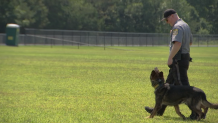Lee la historia en español aquí.
After six years with the Ocean County Sheriff’s Office, Stosh is at the height of his career -- he’s busted drug dealers and found large amounts of narcotics in cars.
But because the German Shepard was trained on detecting marijuana and small amounts of the drug are now legal in New Jersey, Stosh got the pink slip.
He and three other K-9s in the Ocean County Sheriff’s Office were fired-- or sent to early retirement.
Get Philly local news, weather forecasts, sports and entertainment stories to your inbox. Sign up for NBC Philadelphia newsletters.
“They all have marijuana in them. So they're pretty much very limited in their capacity right now,” Investigator James Riley told NBC10 as he stood next to Brutus, a 9-year-old German Shepard narcotics dog.

That’s happening all across New Jersey and the nation. Police and sheriff departments are deciding what to do about their marijuana-trained dogs. Some are retiring the dogs, others are keeping them and using them for patrol, search and rescue.
Local
Breaking news and the stories that matter to your neighborhood.
The bread and butter of Ocean County’s narcotic K-9 dogs is establishing probable cause with vehicle stops-- meaning that officers can search a car without a search warrant. The dog’s scent is enough to run a search of the vehicle.
“We do a lot of residences or building searches, but a bulk of it is the motor vehicle stops,” Riley said.
But those searches are completely off limits now.
“If he was to indicate a car had marijuana in it… it would be an illegal search,” Riley said.

And the New Jersey Attorney General’s Office agrees.
“A dog trained to alert officers to marijuana can no longer be used to establish probable cause for a search because it will react and alert officers in circumstances where there is not, in fact, a crime being committed, i.e., where there is marijuana, which has been decriminalized,” the office wrote in an emailed statement.
Narcotic dogs are trained to detect the smell of certain narcotics-- usually marijuana, cocaine, heroin and methamphetamine-- but they aren’t able to tell their handler which of the drugs they are smelling. Just that they smell an illegal substance.
Once a dog has been trained to smell marijuana, it can’t be retrained to not smell it anymore.
The AG’s Office has not issued official guidance but told NBC10 in an email that marijuana-trained dogs may still be used in searches where a search warrant has been issued and the dog is not establishing probable cause.
The Camden County Sheriff’s Office is using two of its marijuana-trained dogs for those types of court-approved searches, and not retiring the dogs. In addition, their dogs are cross-trained in patrol so they can be used to help.
The New Jersey State Police has nine dogs that were also trained on marijuana and are keeping them for patrol and other duties.
But Don Slavik, executive director of the U.S. Police Canine Association, believes that keeping the marijuana-trained dogs is risky.
“They may run across some marijuana and go over there and sniff and actually go on to a final position, which is what they're trained to do. And I think that's the problem,” Slavik said. “Their noses are always sniffing.”
Slavik said police departments he’s spoken to in other states where marijuana has been legalized or decriminalized are simply retiring the dogs and getting new ones.
“They get rewarded for sniffing and doing what they're supposed to do. And... they don't just stop. They don't realize that they can't stop. They can't. They aren't supposed to,” he said.
Washington Township Police Chief Patrick Gurcsik says he’s no longer using his five marijuana-trained dogs for any narcotics work. The dogs were cross-trained in tracking so he is using them for just that. But tracking consists of 25 percent of their job, so they won’t be as busy as before.

His department’s K-9 unit is funded through donations, including what he called a state of the art K-9 kennel built in 2015. He’s not sure if the community will want the department to purchase new narcotics dogs that aren’t imprinted on marijuana.
“We’re considering all options,” he said. “But we may not be replacing them.”
A police dog can cost about $5,000 untrained, according to the Police Canine Association President. And then several thousand dollars for training if the training isn’t done in-house.
But the real cost is the handler’s salary.
“You're assigning an officer for three quarters of a year,” Riley said. “You're going to lose them off the road for a considerable amount of time.”
Riley told NBC10 that training can take up to nine months.
Like other departments in the state, Ocean County had seen the writing on the wall with the decriminalization of marijuana and they made sure that their most recent police K-9 purchase was a dog not trained in detecting it.

But that's just one dog for the whole county- and municipalities it serves-- to search for drugs. Some of the township police departments have newer dogs. But Riley says it’s probably a total of eight or nine dogs, compared to the 24 county-wide total that used to be available.
“It's hampered drug investigations,” he said.
And the dogs miss the work, according to Stosh’s handler, Officer Kevin Fennessy.
Stosh had at least four years left in him to work.
“They're in the prime of their career right now. And we're just kind of having to shut them down,” Riley said.
As for the retiring dogs, their handlers will usually adopt them as family pets. And for handlers who can’t adopt their K-9 partner, some non-profit organizations will help find the dogs new homes.
Luckily for Stosh and Brutus, each of their handlers plan to keep them as pets.
And even though the police dogs are retired, Ocean County taxpayers will continue to pay for their healthcare for the rest of their lives, according to Fennessy.
“He could be off the road for two years, if something happens,” he said. “And he needs a major surgery or something, the county will pay for it.”




